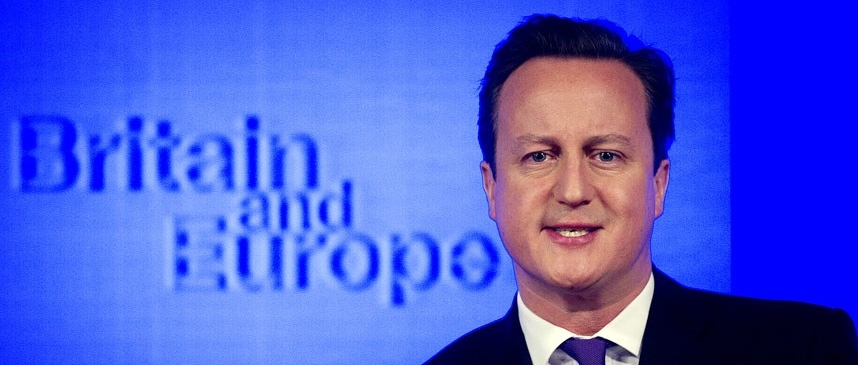
David Cameron is short on specifics over Europe
David Cameron is not talking about Europe. In the past the prime minister has said that he will change the EU by reforming it, and that he will change the UK’s relationship with other EU countries by renegotiating it. He has also said that he will ensure, by treaty change, that some EU powers (he has not yet said which ones) will be repatriated to all member states. By 2017, when this has been accomplished, he promises a referendum to establish whether Britain wants to leave or stay.
On the campaign trail this referendum promise is regularly repeated. But on the reform, renegotiation and repatriation that are supposed to precede it, nothing is said. The few clues that have emerged are confused and confusing. In 2011 Mr Cameron wanted safeguards for the City of London — but the ideas he launched in a midnight European Council, with no advance preparation, sank without trace, as Angela Merkel, German chancellor, had warned him they would. In a 2013 speech he seemed concerned to increase EU competitiveness; fine, said other EU governments, expecting specific proposals. They are still waiting.
By late 2014, with the UK Independence party pressing on immigration, they heard instead that the concern was to reduce UK welfare payments to citizens of other EU countries currently living in the UK: not so fine, said other EU governments, pointing out that their people in Britain pay more in taxes and for services than they claim in welfare. And surely an efficient labour market helps competitiveness? And aren’t Brits living in other EU countries as numerous as their citizens now in Britain? No answers have been given; no proposals put forward in Brussels; no explanations provided for a nation that will next month go to the polls. Mr Cameron’s EU reform is a mantra without, as yet, any defined meaning.
So are the aims of his “renegotiation”. Mr Cameron’s only promise is that the job will be done before a referendum in 2017. Other governments know that in that timescale no treaty change is possible. They have spotted that Whitehall’s 3,000-page survey of the “Balance of Competences” has not identified a single subject on which reducing EU powers would benefit Britain: no wonder Number 10 chose to bury it.
No other European government has argued for any “repatriation” of powers, and since all would have to agree to any such transfer, they — like British voters — do not know what Mr Cameron is on about. They hear his hectoring of EU colleagues and institutions; they note that he cannot bring himself to welcome reforms that are actually happening, or the European Commission’s much reduced legislative programme; and they tire of waiting for his prescriptions. The manifesto, long on slogans but short on specifics, will not help them much.
While Mr Cameron is silent on what he wants in Brussels, he is clear that if he gets it he will recommend that Britain stays in. But other governments, and British business, and inward investors, and the City, are starting to ask themselves whether the converse might not also be true. They fear that Mr Cameron lacks a strategy; might ask for too much or alienate too many; and so might stumble into British exit by accident.
The silence is not hard to explain, in crude political terms. The EU issue divides the Conservatives, so Mr Cameron would rather talk about anything else. But the issue is crucial to the country’s future. If the voters, like the foreigners, are kept in the dark about his EU aims, how are they to judge whether they are either desirable or obtainable? And is it fair to electors to offer them a pig in a poke, promising unspecified reforms, unclear renegotiations, and unrealistic repatriation of powers?
It may also be bad politics. The polls show voters more convinced than ever that leaving the EU would be unwise. Silence is not always the best policy.
John Kerr is a crossbench peer and chairman of the Centre for European Reform.
